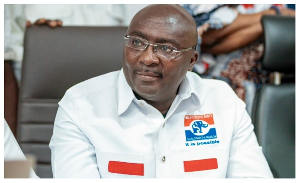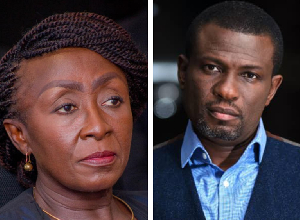The value of investments in the stabilisation and heritage funds, the two funds set up to set aside a portion of government oil revenues for a rainy day, topped US$278million in the first half of the year, the Bank of Ghana (BoG) has said.
The stabilisation fund, whose purpose is to shore-up government spending during downturns, accumulated investments worth US$201.6million in the period; meanwhile, the heritage fund -- created to retain part of current revenues for future generations -- held assets worth US$77.2million.
Keen to avoid the infamous “resource curse”, Parliament enacted the Petroleum Revenue Management Act to lay down rules for the expenditure of oil revenues after Ghana joined the club of oil producing countries in December 2010.
The rules require that only a maximum of 70 percent of petroleum income in any year can be spent on the fiscal budget; the remainder must be paid into the petroleum funds, the bigger share of which is transferred to the stabilisation fund.
Of the US$1.53billion earned to government from petroleum revenues since the start of production to the first six months of this year, US$277.8million has been saved to the two funds, which have yielded about US$1million in interest during the period.
Around 35 percent -- US$541.8million -- of the combined revenues since production was realised in the first half of 2013. The amount, which was up 66 percent from the first half of 2012, included -- for the first time, corporate taxes of US$119million from oil-producing companies.
While oil has brought good tidings to the economy, many analysts warn against getting into a frenzy over what is essentially just another commodity like gold and cocoa -- which have dominated the economy for decades.
As commodity markets see a downturn in 2013, the reality of commodity-dependence is dawning once again on policymakers amid fears that Ghana’s exports will underperform and economic growth be stifled. Growth surged to 15 percent in 2011, the first full year of hydrocarbons production, before softening to 7.9 percent in 2012. It is expected to be 8 percent this year.
Among the economy’s weaknesses is poor, decaying infrastructure which the World Bank says cuts a few percentage points off GDP growth every year; and part of the country’s oil revenues have been pledged to the US$3billion loan agreed with the China Development Bank (CDB) to rapidly build and repair infrastructure.
The flagship project in the Ghana-CDB loan agreement is the Atuabo gas-processing plant which, despite delayed construction because of slow release of funds by the Chinese lender, is set to be completed in 2014.
Government says the plant will transform electricity production, as it will generate cheaper gas to fuel thermal plants and improve electricity reliability.
Business News of Thursday, 22 August 2013
Source: B&FT

















